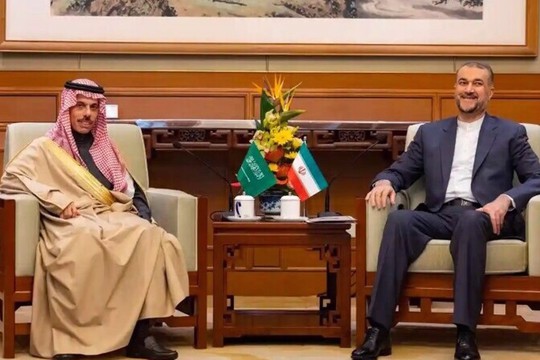Iran’s Foreign Minister Hossein Amir-Abdollahian meets Saudi Arabian counterpart Faisal bin Farhan in Beijing.
Photo: AFP
What convinced the Saudis to reverse their unfriendly, if not hostile, stance towards Iran and opt for diplomacy and dialogue?
Following the Iran-Saudi Arabia meeting in China and their agreement to restore diplomatic relations after seven years, the region faces a fresh challenge to reset the shady past and open a new bright chapter, writes Elijah J. Magnier, a veteran war correspondent and a political risk analyst with decades of experience covering the West Asian region.
Peace and de-escalation in the West Asian region are possible if such forward-looking agreements are translated into action, followed by practical steps and measures to rebuild trust and reduce tensions.
China's role as a mediator was a surprise that should not be underestimated. The fact that Saudi Arabia chose Beijing attests to what Iran has been saying for a long – the US is no longer a big player or peacemaker.
As a trusted superpower, China hosted the breakthrough talks that ended months-long efforts by the two sides to open a new chapter in their bilateral ties, meeting multiple times in Iraq and Oman.
However, the shift towards positive Saudi enthusiasm is because confronting Iran is no longer a viable and realistic option, and stability is essential for Saudi Arabia’s future plans.
Moreover, the aftermath of the US-Russian war on Ukrainian soil has significantly accelerated the Saudi-Iranian rapprochement, significantly changing global power dynamics.
For many years, Saudi Arabia sought to destabilize Iran, mainly through its involvement in regional conflicts and support for inimical forces within Iran as well as funding of anti-Iranian media.
After the US aggression against Iraq in 2003, Saudi Arabia again provided financial support to insurgent groups, including al-Qaeda in Iraq, the group that later took the shape of Daesh (both are banned in Russia). These groups have been largely responsible for attacks against Iraqi security forces and Shia, Sunni and Kurdish civilians.
In 2008, then-Saudi Crown Prince Abdullah urged Americans to "cut off the head of the snake", referring to Iran. One of the main ways Saudi Arabia has sought to counter Iranian strategic influence in the region has been through its involvement in the conflicts in Lebanon, Iraq, Syria, Yemen and Palestine.
In addition, since the start of the Syrian conflict in 2011, Saudi Arabia supported various rebel groups. These groups have been involved in some of the most intense confrontations in the conflict and have been responsible for numerous atrocities against civilians.
In 2015, Saudi Arabia led a coalition of Arab states fighting the Ansarallah resistance movement in Yemen. The conflict fueled one of the worst humanitarian crises in modern history, with thousands of civilian casualties and widespread destruction.
What then convinced the Saudis to reverse their aggressive stance towards Iran and opt for diplomacy and dialogue?
In Lebanon, Hezbollah has emerged as one of the strongest and most organized resistance forces in the Middle East, a deterrent to the Israeli regime, which is clearly afraid to provoke it into another confrontation.
In Iraq, after the Iraqi army was disbanded and on the run after the fall of Mosul, Baghdad called on Iran and its allies to help.
Iran’s top anti-terror commander General Qassem Soleimani stopped the terrorist group’s advance towards Kurdistan and the holy shrines, including Baghdad and southern Iraq.
In Syria, the attempt to plant a ‘puppet regime’ was thwarted when the Syrian government sought the support of Iran and its allies.
In Yemen, the Ansarallah resistance movement was able to gain experience in warfare and combat to defeat the US-Saudi-Emirati coalition, force a ceasefire and make the continuation of the war pointless.
Domestically, the US has used all possible means to starve the Iranian people into submission. The harshest sanctions have been imposed on the Islamic Republic, along with assassinations of scientists, sabotage of government institutions, and 'color revolutions' under various names.
All these plots failed, including the recent months-long riots backed by both Americans and Europeans. A ruling system would never have survived without a society and popular support sufficient to sustain it.
All these years have convinced its enemies and rivals that Iran will not fall.
The Islamic Republic never surrendered and challenged the US by bombing one of its main military bases in Iraq (Ain al-Assad) after the top resistance commanders were assassinated in a cowardly airstrike in the Iraqi capital.
Iran exported its knowledge of warfare to many powerful groups and countries and established trade and commerce with Russia and China.
Iranian ships sailed to Venezuela, in the backyard of the USA, and military ships docked in Brazil.
Iran joined China and Russia in several naval maneuvers, making the Islamic Republic, by its own choice, a regional superpower with nuclear knowledge.
The US-Russian war in Ukraine has brought a new balance to the world in which the West, with 16% of the population, is no longer the dominant power in the world. The US and the EU hegemony is being challenged, and intelligent countries prefer not to be on the losing side.
Iran-Saudi deal is a real blow to the US and Israel.
Moreover, Saudi Arabia's Crown Prince has a vision for 2030 based on a thriving economy, an ambitious plan and stable security.
Saudi Arabia has no choice but to move closer to Iran to bring peace and stability to the region. Iran is no longer the enemy, and the countries around it are ready to drop their hostilities to begin a new era if no outside interference spoils the relationship.
It is time for both sides to focus on their prosperity rather than investing in rivalries. And it’s time for Saudi Arabia and its Arab allies to look at the world beyond the US and the Israeli regime, Elijah J. Magnier stresses.
read more in our Telegram-channel https://t.me/The_International_Affairs

 11:20 02.05.2023 •
11:20 02.05.2023 •























